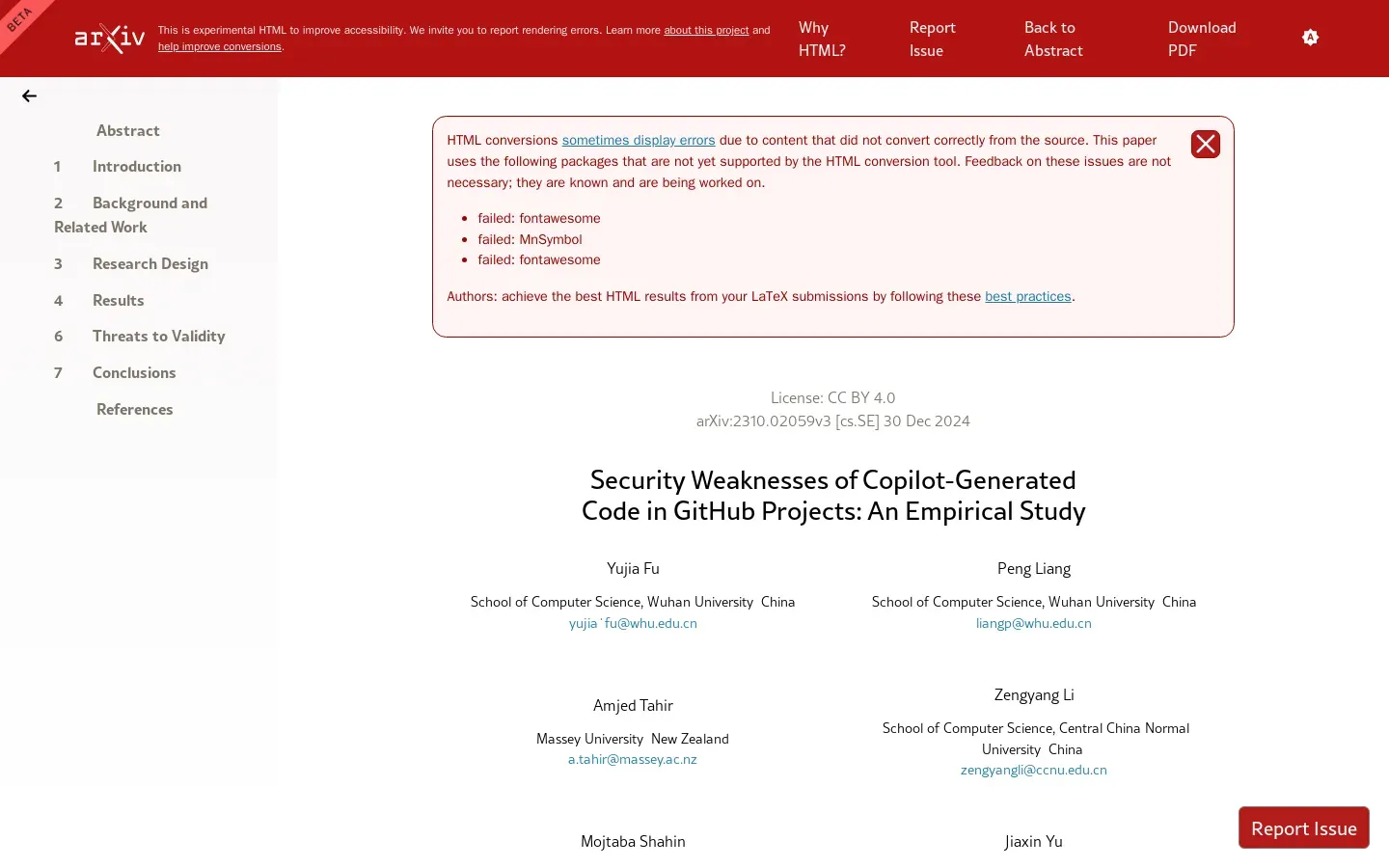
Security Vulnerabilities in AI-Generated Code Identified
/ 4 min read
Quick take - Recent research has identified significant security vulnerabilities in AI-generated code, particularly from GitHub Copilot, and proposes strategies for enhancing cybersecurity through improved tools, developer training, and the integration of security measures in AI code generation processes.
Fast Facts
- Recent research highlights significant security vulnerabilities in AI-generated code, particularly focusing on GitHub Copilot, and proposes strategies for improvement.
- A systematic methodology was used, including data collection, static security analysis, categorization of weaknesses, and evaluation of remediation capabilities.
- Key findings indicate a lack of developer awareness regarding AI-generated code vulnerabilities and the need for enhanced static analysis tools tailored to these unique challenges.
- Future directions include developing advanced security tools, implementing training programs for developers, and integrating security features into AI code generators.
- The study emphasizes the importance of continuous security analysis and targeted prevention strategies to ensure safe software development with AI technologies.
Enhancing Cybersecurity in AI-Generated Code: Key Findings and Future Directions
In a rapidly evolving technological landscape, the integration of artificial intelligence (AI) into software development has introduced both opportunities and challenges. Recent research has cast a spotlight on the security vulnerabilities inherent in AI-generated code, with GitHub Copilot serving as a focal point. The study provides critical insights into these vulnerabilities and suggests strategies to bolster security in AI-assisted software development.
Unveiling Security Weaknesses
The research underscores a significant gap in awareness among developers regarding vulnerabilities specific to AI-generated code. This lack of understanding poses risks as AI tools become more prevalent in coding practices. The study’s findings emphasize the need for enhanced static analysis tools capable of addressing the unique challenges presented by AI-generated code. Current tools may fall short, highlighting an urgent need for innovation in this area.
Methodological Approach
A structured methodology was employed to ensure a comprehensive evaluation of AI-generated code vulnerabilities. The process began with data collection and filtering, gathering diverse AI-generated code samples for analysis. Static security analysis techniques were then applied to detect potential weaknesses. These vulnerabilities were categorized using the Common Weakness Enumeration (CWE) framework, providing a clearer picture of their nature and prevalence. Finally, the effectiveness of Copilot Chat in offering remediation solutions was assessed.
Key Insights and Implications
One of the study’s pivotal insights is the necessity for application domain-specific security measures. Different domains may require tailored approaches to effectively mitigate risks, underscoring the importance of context-specific strategies. Additionally, integrating AI into security remediation processes can enhance both efficiency and effectiveness, suggesting a promising avenue for future development.
Strengths and Limitations
The research stands out for its systematic evaluation of AI-generated code vulnerabilities, highlighting the importance of integrating security awareness into the development process. However, its focus on GitHub Copilot may limit the applicability of findings to other AI code generation tools. Furthermore, the study does not account for varying developer experience or project contexts, which could influence security outcomes.
Areas for Further Exploration
To build on these findings, further investigation is encouraged in several areas. Expanding the analysis to encompass a broader range of programming languages and AI tools could enhance generalizability. Additionally, exploring how developer experience and project context impact security weaknesses in AI-generated code would provide valuable insights.
Future Directions
Looking ahead, several future directions are proposed to enhance cybersecurity in AI-generated code:
-
Enhanced Security Tool Development: Developing advanced tools specifically designed to address vulnerabilities in AI-generated code.
-
Training and Awareness Programs: Implementing comprehensive initiatives to improve developers’ understanding of AI-related security risks.
-
Integration of Security Features: Incorporating best practices directly into AI code generation tools to mitigate vulnerabilities from inception.
-
Longitudinal Studies: Conducting extended research to monitor the long-term effects of AI code generation on software security.
Implications for Cybersecurity
The findings underscore a critical need for continuous security analysis and targeted prevention strategies when utilizing AI code generation tools. By pursuing these recommended future directions, stakeholders can contribute to a more secure software development landscape, ensuring that the benefits of AI technology are harnessed without compromising security.
As the industry moves forward, these insights provide a roadmap for enhancing cybersecurity measures in an era increasingly defined by artificial intelligence-driven innovation.



